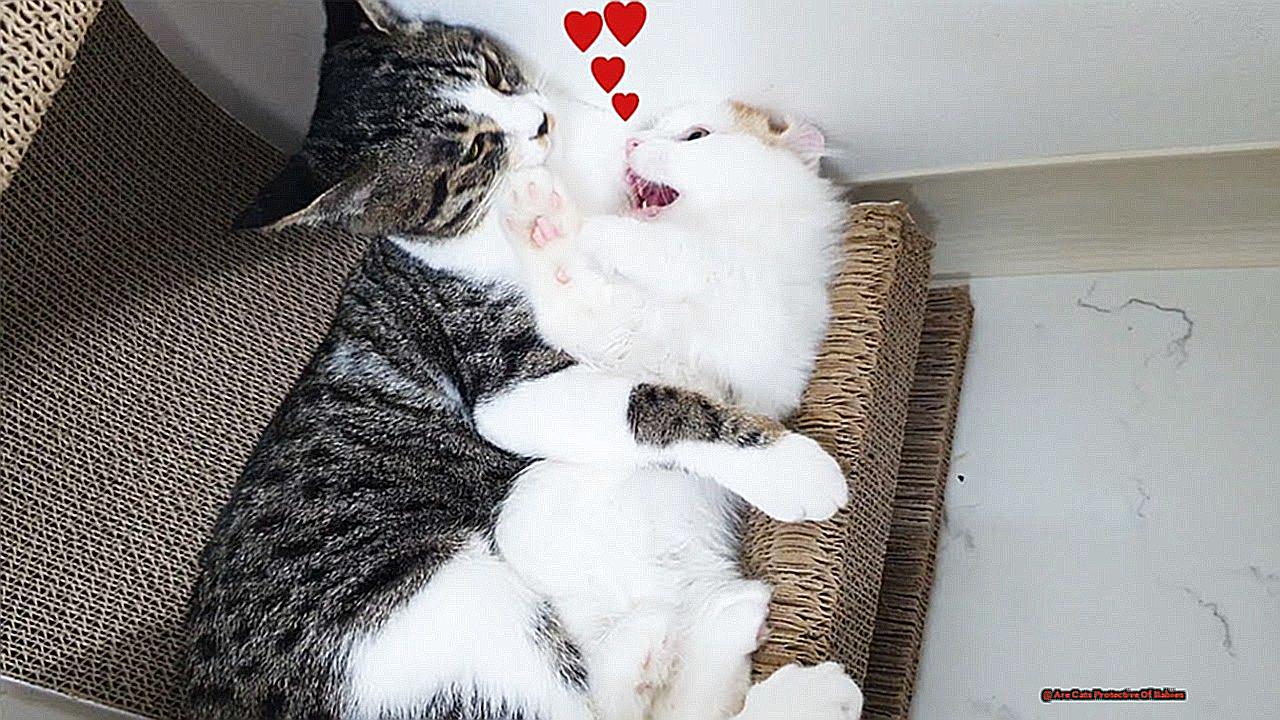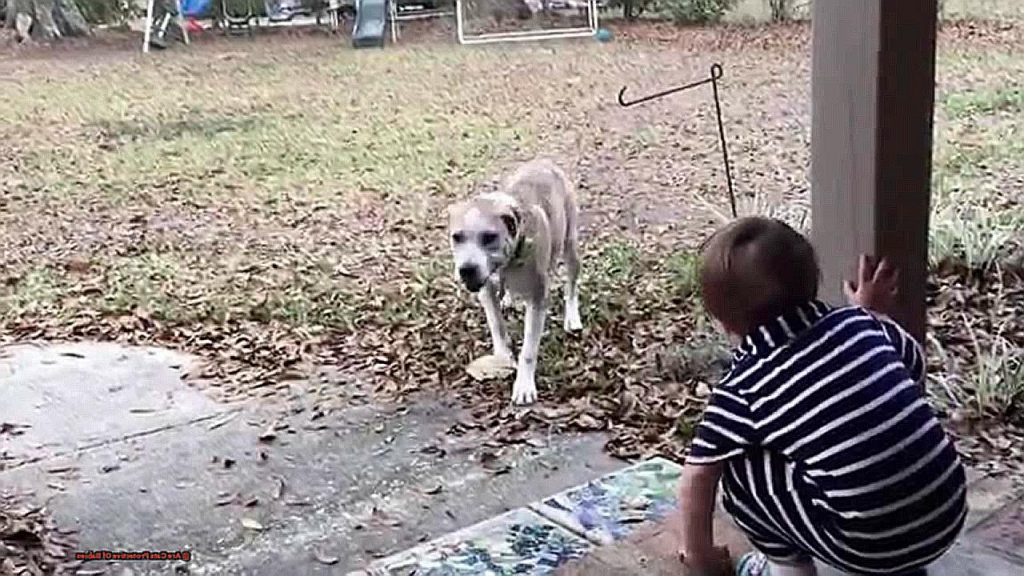Cats and kids might not look like they would get along, but don’t let that fool you.
As a cat fan and soon-to-be parent, the thought of these two living things getting along was interesting to me. I was also happily surprised to learn that cats are good at taking care of and protecting little ones.
We’re going to talk more about the special bond between cats and babies, whether you already have a baby or are getting ready to have one.
Are Cats Protective Of Babies?
Contents
First things first, let’s address a common misconception – cats may not have the same protective instincts as dogs, but that doesn’t mean they can’t be protective of babies. In fact, many cats can exhibit protective behavior towards their human family members, including babies.
So, what factors influence whether a cat will be protective of a baby or not? Let’s dive in.
- Relationship with their owner: Cats are known to form strong bonds with their owners. If your cat has a close and loving relationship with you, they are more likely to be protective of anything that belongs to you, including your new bundle of joy.
- Personality: Just like humans, cats have their own unique personalities. Certain breeds, such as Siamese, Ragdoll, and Burmese cats, are known for their sociable and affectionate nature, making them more likely to be protective of their owners’ newborns.
- Past experiences with babies: If your cat has had positive interactions with babies before, they may be more likely to be protective of them. This is why it is important to socialize your cat with children from a young age.
- Feeling safe and secure in their home: Cats need their own space and should have access to areas where they can retreat if they feel overwhelmed or stressed. This will help them adjust better to the new addition and make it less likely for them to act out in aggression towards the baby.
Now that we’ve covered the factors that can influence a cat’s protectiveness towards babies, let’s talk about some signs that your cat may be protective of your little one:
- Staying close to the baby
- Purring or rubbing against the baby
- Grooming the baby
- Showing signs of distress when the baby cries
But what if your cat doesn’t seem to be protective of your baby? Don’t worry, this is completely normal. Cats, just like humans, have different personalities and may not all exhibit the same behavior. Some cats may even see a baby as a threat or competition for attention and may show signs of jealousy or aggression towards the baby.
Understanding Cat Behavior and Instincts
As a cat behavior expert, I have seen firsthand the ways in which cats can be fiercely loyal and protective towards babies. In this post, we will explore the protective instincts and behaviors that cats have towards babies, providing valuable insights for cat owners to create a safe environment for both their feline and human family members.
The Hunting and Predatory Nature of Cats
One of the main instincts that drive cats to be protective of those they consider part of their family is their hunting and predatory nature.
In the wild, mother cats would fiercely protect their kittens from any potential danger, and this behavior can also be seen in domesticated cats towards human infants. Cats are territorial creatures, and they see their home as their territory. This instinct drives them to protect their territory and those within it, including human family members.
The Strong Sense of Smell in Cats
Cats have a highly developed sense of smell, and they can pick up on changes in hormones and pheromones in humans. When a woman is pregnant, her body goes through hormonal changes that can be detected by cats, making them more aware of the presence of a new baby in the house.
This heightened sense of smell may contribute to a cat’s protectiveness towards babies, as they can sense the changes happening in their home.
The Intuition of Cats
Cats are also very perceptive creatures and can pick up on subtle cues from their human family members. They can sense when someone is upset or in distress, and they may try to comfort or protect them.
This same intuition can extend to babies, as cats may sense when a baby is crying or in need of attention and try to provide comfort or protection. This behavior may be more apparent in cats who have a strong bond with their owners and are attuned to their emotions.
Understanding Individual Differences
It’s important to note that every cat is different, and their protective behaviors may vary. Some cats may be more naturally nurturing towards babies, while others may take longer to warm up or may not show as much overt protection.

It’s essential for cat owners to observe their cat’s behavior towards babies and take appropriate steps to ensure a safe environment for both the cat and the baby.
Factors That Influence a Cat’s Protective Behavior Towards Babies
Cats are known for being independent and cool, which makes many people think they don’t protect their people family members. But this is not at all true. It’s amazing how protective cats can be of their human babies. Knowing the different things that make cats act this way can help you keep both the cat and the baby safe and happy.
Cats’ protective traits depend a lot on their age and how much they’ve been around other cats. Babies are more likely to feel safe around cats that have been around them since they were young. Baby sounds, smells, and moves are normal to them now, so they think of kids as part of their family. On the other hand, cats that haven’t been around babies before might think of them as dangerous or strange, which could make them act scared or violent.
Cats are very protective, but their attitude also plays a big role in this. When it comes to babies, some cats may be more loving and caring, while others may be more shy and wary. This may depend on their breed, how they were raised, and their own personality. Siamese cats, for example, tend to be louder and want to be the center of attention more, which makes them more likely to protect their human baby brothers.
Another important thing to think about is how the cat gets along with the baby’s parents or caretakers. Cats are very sensitive and can pick up on the feelings and energy of people nearby. If a cat is close to the parents or people who care for it, it may want to protect its young more. If, on the other hand, the cat feels frightened or ignored by its owners, it might not guard the baby.
Some of the things that affect the cat and baby’s connection are the places where they live together. Cats are very protective, and they might feel scared or attacked in a strange or noisy place. This might change how they act around the baby because they might see them as a threat to their area. It is very important to make sure that both the cat and the baby can live together happily.
Cats may also be more protective of babies if they have had bad events in the past. If a cat has had good experiences with babies in the past, it may be more likely to trust and care for a new baby. If a cat has had a bad experience with babies in the past, on the other hand, they might be wary or even mean to them. It is very important to slowly and carefully introduce cats and kids to each other to make sure they get along well.
Signs of Protective Behavior in Cats Towards Babies
Staying Close to the Baby
One of the most obvious signs of a cat’s protective behavior towards a baby is when they stay close to them. Cats are naturally curious animals and they like to keep an eye on their surroundings. So if you see your cat following the baby around or curling up next to them while they sleep, it could be a sign of their protective nature.
Increased Vocalization and Attention
Cats are not known for being chatty, but when it comes to babies, they may become more vocal. They may meow or purr more frequently, almost as if trying to communicate with the baby. This increased attention and affection towards the baby is a clear indication of their protective instincts.
Territorial Behavior
Cats are also territorial animals and they may exhibit this when it comes to protecting a baby. They may become more aggressive towards other pets or people who get too close to the baby, as if guarding their territory. This behavior is a strong indication that your cat sees the baby as part of their family and will do whatever it takes to protect them.
Acting as a “Nanny”
In some cases, cats may even act as “nannies” to babies. They may try to comfort them when they cry or even play with them gently. This shows a level of empathy and understanding from the cat towards the baby. It’s almost like having an extra caretaker for your little one.
Trust Your Cat’s Intuition
Cats have a strong sense of smell and can pick up on changes in their environment. So if your cat senses a threat or danger towards the baby, they may exhibit protective behavior to keep them safe. It’s important to pay attention to these signs and not dismiss them as mere coincidences.
The Importance of Supervising Interactions Between Cats and Babies
Here are some reasons why:
Cats may see the baby as a threat
Cats have a natural instinct to protect their territory, and a new baby can be perceived as a potential threat or intruder. This can lead to defensive or aggressive behavior towards the baby.
Babies are at risk of unintentional harm
Babies are curious and may try to grab onto or pull the cat’s tail, which can result in scratches or bites. They may also accidentally roll over on the cat or squeeze them too tightly.
Intervention is crucial
By closely supervising interactions, parents can intervene if necessary and prevent any potential accidents from happening. It also gives the cat time to adjust to the new family member and become comfortable with their presence.
Never leave them alone together
It only takes a split second for an accident to happen, so it’s important never to leave your cat and baby alone together, even for a short amount of time. Constant supervision is key.
Prevent stress and anxiety in cats
Introducing a new baby can be stressful for cats, especially if they feel like they are being replaced or ignored. By supervising interactions, parents can make sure their cat is getting enough attention and affection, which can help prevent any negative behavior towards the baby.
Addressing Aggressive or Overly Protective Behavior in Cats Towards Babies
Cats are naturally curious and territorial animals, and this can often lead to aggressive or overly protective behavior towards new additions to the family. As a cat owner, it is important to understand and address this behavior early on to ensure the safety and harmony between your cat and baby.
In this blog post, we will discuss effective strategies for addressing aggressive or overly protective behavior in cats towards babies, emphasizing the importance of understanding feline instincts and utilizing positive reinforcement.
Understanding Feline Instincts
First and foremost, it is essential to understand that this behavior is not a reflection of your cat’s personality, but rather an instinctual reaction to a perceived threat or change in their environment. Cats are natural hunters and protectors, so having a new addition in their territory can trigger feelings of displacement or threat. It is crucial to approach this behavior with empathy and patience rather than punishment or discipline.
Common Signs of Aggressive or Overly Protective Behavior
Some common signs of aggressive or overly protective behavior in cats towards babies include hissing, swatting, growling, and even biting. These behaviors can be triggered by various factors, such as sudden movements or loud noises from the baby, unfamiliar scents, or feeling displaced by the new addition. It is crucial to pay attention to any changes in your cat’s behavior towards the baby and address them promptly.
Effective Strategies for Addressing Aggression
Slowly Introduce the Cat to the Baby
One approach is to gradually introduce your cat to the baby by allowing them to smell each other from a distance and slowly increasing their interaction under supervision. This process may take time, but it can help your cat adjust to the new addition and reduce their aggressive or protective behavior.
Provide Positive Reinforcement
Positive reinforcement is a powerful tool in modifying your cat’s behavior towards the baby. When your cat displays calm and non-aggressive behavior around the baby, be sure to provide treats and praise to reinforce positive associations. This will help your cat learn that good behavior results in rewards, encouraging them to continue behaving positively around the baby.
Nurturing Bonds Between Cats and Babies: Tips for Parents
To begin, it’s important to know that each cat is unique. They have their own traits and ways of acting, just like people do. Not all cats are usually friendly and loving with kids. Some may be more distant or even scared of them.
It is very important for parents to watch how their cat acts around babies before bringing them to their own child. If your cat has a history of being mean or quickly frightened, be extra careful when bringing your baby to them.
You can help your cat get ready for the new baby by letting them help you get ready. Cats like things to stay the same, so when their surroundings changes, it can be stressful for them. Let your cat check out the nursery and any new baby gear, like cribs and strollers, so they can get used to the smells and the new space. Also, try to keep your cat’s schedule as stable as possible, such as food and playing times. This will give them a sense of security during this time of change.
Make sure to give your cat lots of love and care after the baby comes. This will help keep everyone from feeling jealous or neglected around the new family member. Also, don’t forget to always watch how your cat and baby connect with each other. From a young age, teach your child how to be gentle with animals, like not pulling on their tail or fur and not troubling them while they eat or sleep.
It’s also important to deal with any strange things your cat does around the baby. If your cat acts mean or scared, you should talk to a trained behaviorist first. For your particular case, they can give you personalized advice and answers that will keep both your cat and baby safe.
Conclusion
Finally, when cats and kids get together, even though it might not seem possible, they can form a special bond. Even though they are different, cats have a natural urge to care for and protect their humans, even babies. Many things affect this defensive behavior, including their nature, how safe they feel in their own home, and their bond with their owner.
It is important to remember, though, that not all cats will be protective of kids. Cats each have their own personalities, and they might not all act the same way. That’s why it’s very important for cat owners to watch how their cat acts around babies and take the right steps to keep both the cat and the baby safe.
Knowing about cats’ habits and actions can also help make the bond between cats and kids more peaceful. Cats are naturally protective of babies because they are hunters and predators, have a strong sense of smell, are intuitive, and have strong territorial traits. When parents recognize their cat’s traits and use positive feedback, they can stop the cat from being aggressive or overprotective around the baby.
As parents get ready for the birth of their child, they should include their cat in the planning and try to keep its habit as much as possible. Giving your cat love and care after the baby is born can also keep it from feeling neglected or jealous. And most importantly, make sure your cat and baby are always safe by watching them communicate.
There may be some problems when a new baby comes into a home with a cat, but a loving relationship can grow between the two with patience, understanding, and the right safety measures.






